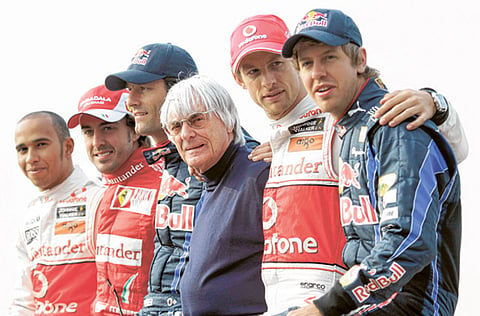Ecclestone just getting better with age
At 80, ecclestone is a racing powerhouse with no retirement plans

London: Red Bull and the ever-cheeky Sebastian Vettel presented Formula One supremo Bernie Ecclestone with a walking frame, equipped with steering wheel and front wing, as an 80th birthday gift last weekend.
The billionaire Briton, who will be reaching his milestone today with plenty of energy but not much in the way of a celebration, saw the joke.
On current form, there is about as much chance of Ecclestone needing the present as there is of Ferrari making affordable family runabouts or Lewis Hamilton deciding to pack it in to become a parking attendant.
The former second-hand car salesman, who turned Formula One from a sport for oil-streaked "garagistes" into a billion-dollar glamour business, has no intention of giving up his globe-trotting, deal-making lifestyle for an armchair and slippers any time in the next decade.
"Retire? Why? I need the money. I can't afford to retire," the master of the throwaway quip told Reuters at Sunday's South Korean Grand Prix in Yeongam as he inspected the latest addition to his global circus.
Age is nothing
"I don't worry. Age is nothing. People make me laugh when they talk about one year to the next year," he added with a smile.
"One day you're one age and a day later you're another age. It's all nonsense.
"I'm like Obama, I like to move forward."
Ecclestone, a bespectacled Andy Warhol lookalike in pressed blue jeans and with the theme from the film The Good, the Bad and the Ugly as his mobile ringtone, needs more money about as much as he needs the Zimmer frame.
As he has explained on countless occasions, it is a way of keeping the score more than anything, a means of measuring achievement rather than keeping the wolf at the door. In his London office, he has a sculpture of a pile of $100 bills.
Natural dealmaker
By any standards, he has been a success — from selling buns at a mark-up to schoolmates to making his first fortune trading motorcycles in fuel-starved post-war Britain and then making a mint in Formula One.
A natural dealmaker, with a softly-spoken manner that belies his Machiavellian streak, Ecclestone has a reputation for being uncompromising and almost obsessively neat, with the odd wisecrack thrown in.
One of the advantages of old age, he once suggested, was that the fear of life imprisonment was no longer what it was.
The sport, with a record 20-race calendar lined up for next season and new races on the horizon in India, Russia and the United States, can thank his magic touch for keeping the money pipeline flowing.
Job done, Ecclestone usually leaves the circuit as soon as the grid walk is over and the race started.
The concern, ever present for manufacturers and other stake-holders, is what happens when he is no longer there at all.
Hot water
Ecclestone, who got into hot water last year when he suggested Adolf Hitler was a man "who got things done", has described himself as a kind of a dictator.
"I don't think democracy is the way to run anything," he said recently.
"Whether it's a company or anything, you need someone who is going to turn the lights on and off."
There is no obvious successor lined up for a ringmaster who went through a triple heart bypass in 1999 ("I recommend everybody has one," he said later).
He was more recently divorced from his Croatian wife Slavica after 26 years together.
Lifelong F1 fan
- BeginningsBorn near Bungay in Suffolk, eastern England, his father was a Lowestoft fisherman.
He built up a motorcycle spares business and then went into business with Fred Compton to form the Compton & Ecclestone motorcycle dealership.
In 1957 he bought the struggling F1 team Connaught and attempted to qualify himself for the British Grand Prix. He also went into management, managing Welsh driver Stuart Lewis-Evans, but when his driver died after crashing at the Moroccan Grand Prix, Ecclestone abandoned the sport.
He later returned as manager to Jochen Rindt, whose death at Monza in 1970 made him the sport's only posthumous champion.
Quitting again after that fatality, he returned in 1972 when he bought the Brabham team, and watched it became a winning force with drivers such as Niki Lauda and Nelson Piquet.
- Formula OneHe founded the Formula One Constructors Association (FOCA) and with the help of his lawyer and friend Max Mosley began to gain control of the sport's management and finances.
He united the teams and secured global TV rights, setting up Formula One Promotions and Administration (FOPA).
- PoliticsIn November 1997 it was revealed that Ecclestone had given the Labour Party one million pounds ($1.59 million). The government later decided to exempt Formula One from a proposed ban on tobacco sponsorship. Labour gave the money back.
- PersonalIn March 2009 his divorce from Croatian wife Slavica, now 52, was finalised ending a 26-year association with the ex-model who towered above him. The couple have two daughters.
In January 2010, Ecclestone became part of a bid to buy the struggling Swedish carmaker Saab but small Dutch luxury carmaker Spyker clinched a last-minute deal.
His 2011 calendar will stretch the season to a record 20 races, with the addition of the Indian Grand Prix. Ecclestone has an estimated £1.37 billion ($2.18 billion) fortune, according to the latest Sunday Times Rich List.
This month, he attended the deal signing with Russian PM Vladimir Putin for Russia to host a grand prix from 2014.



